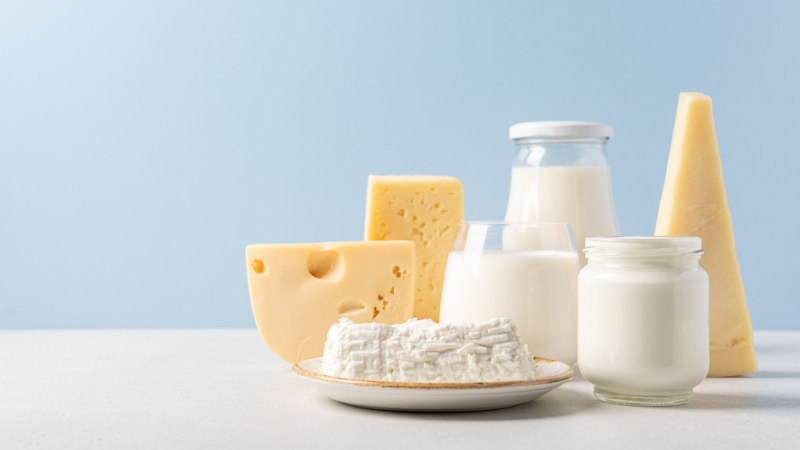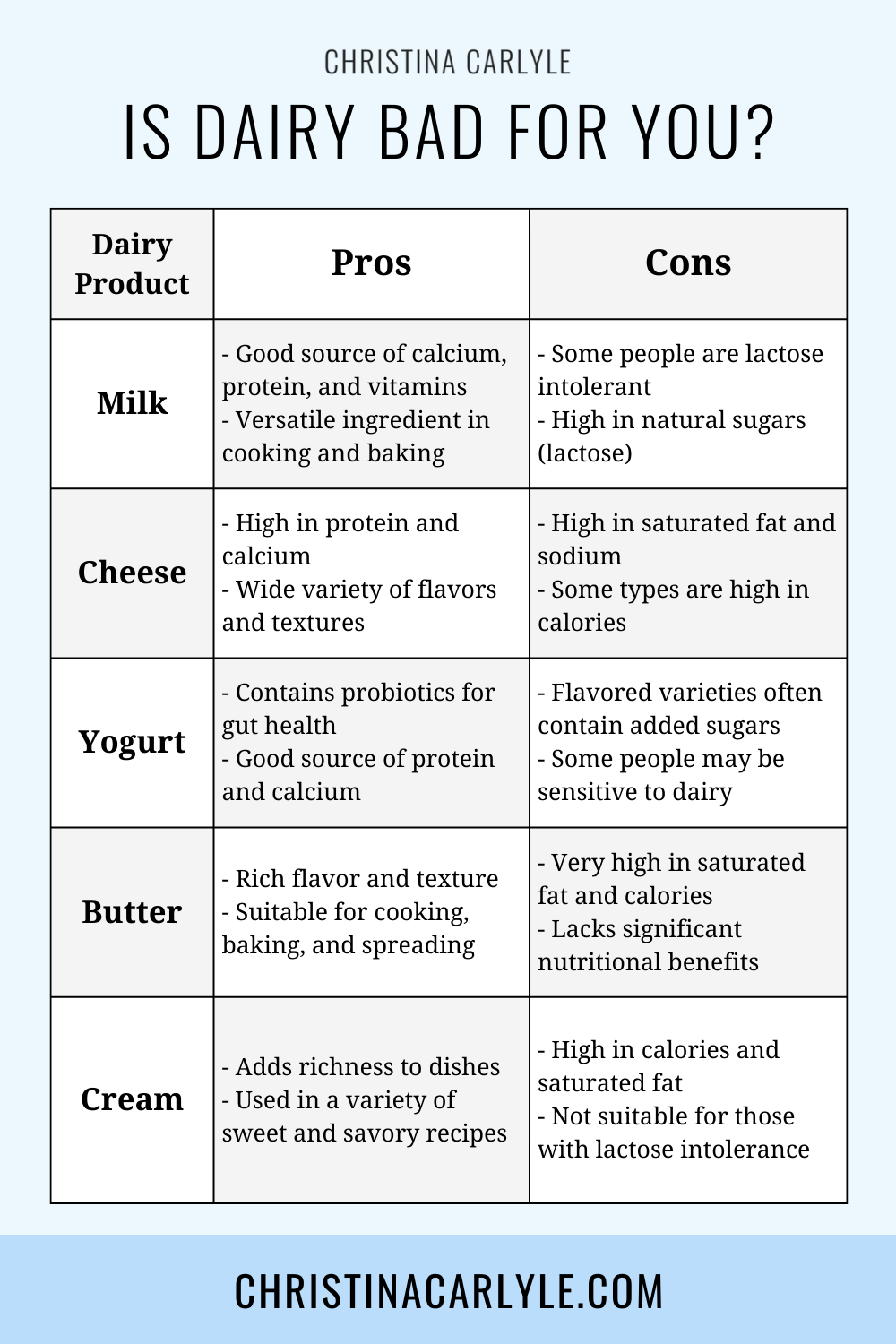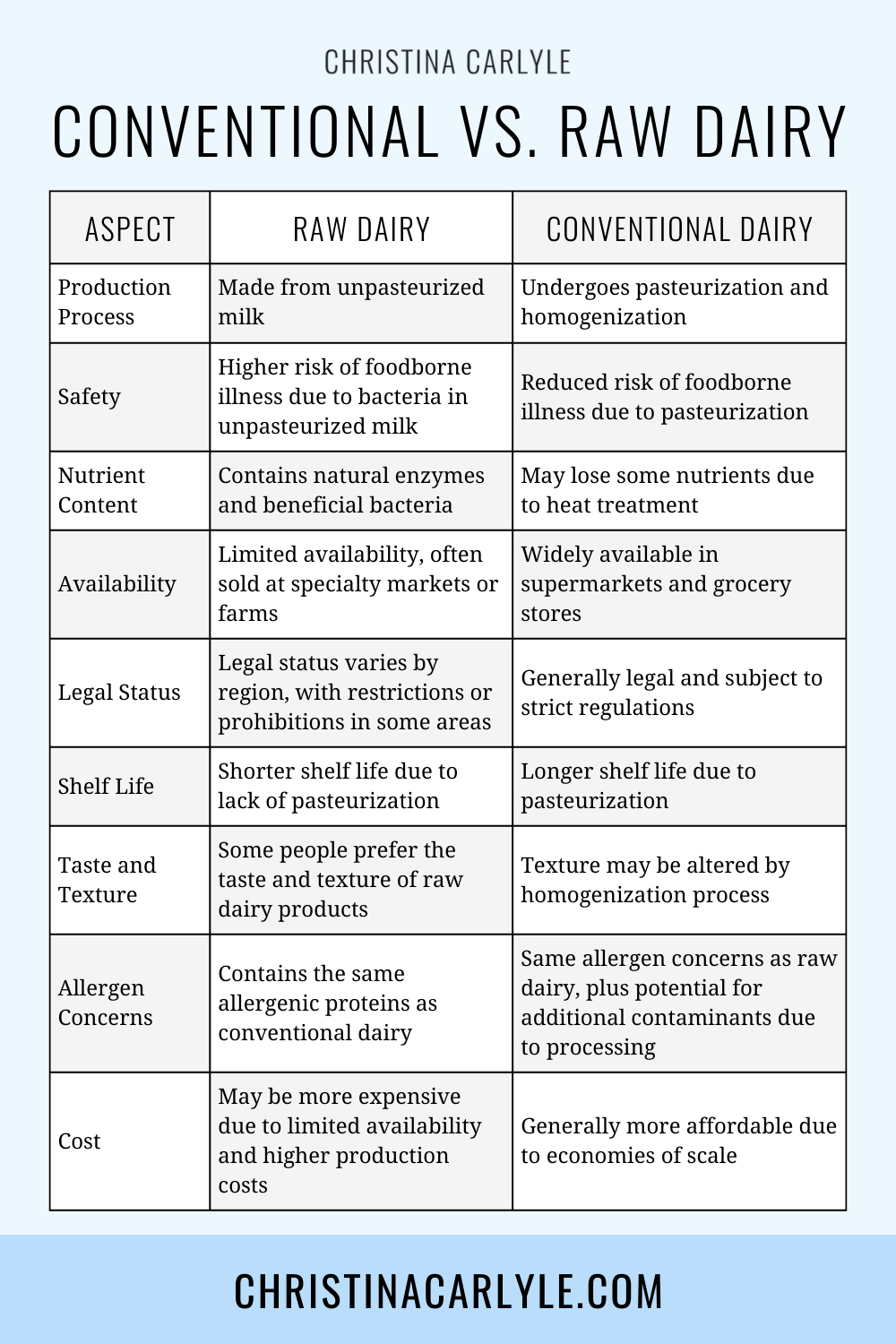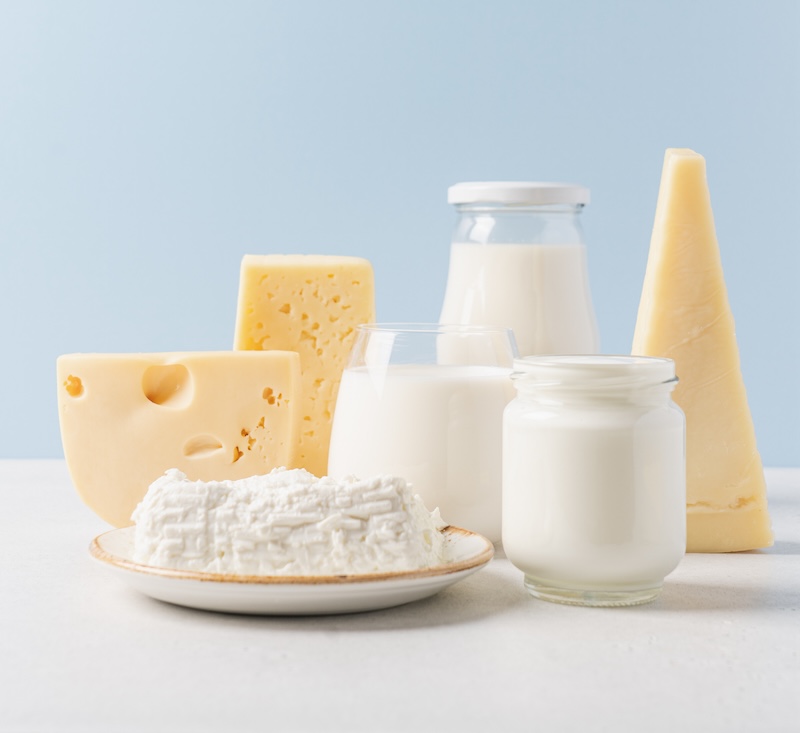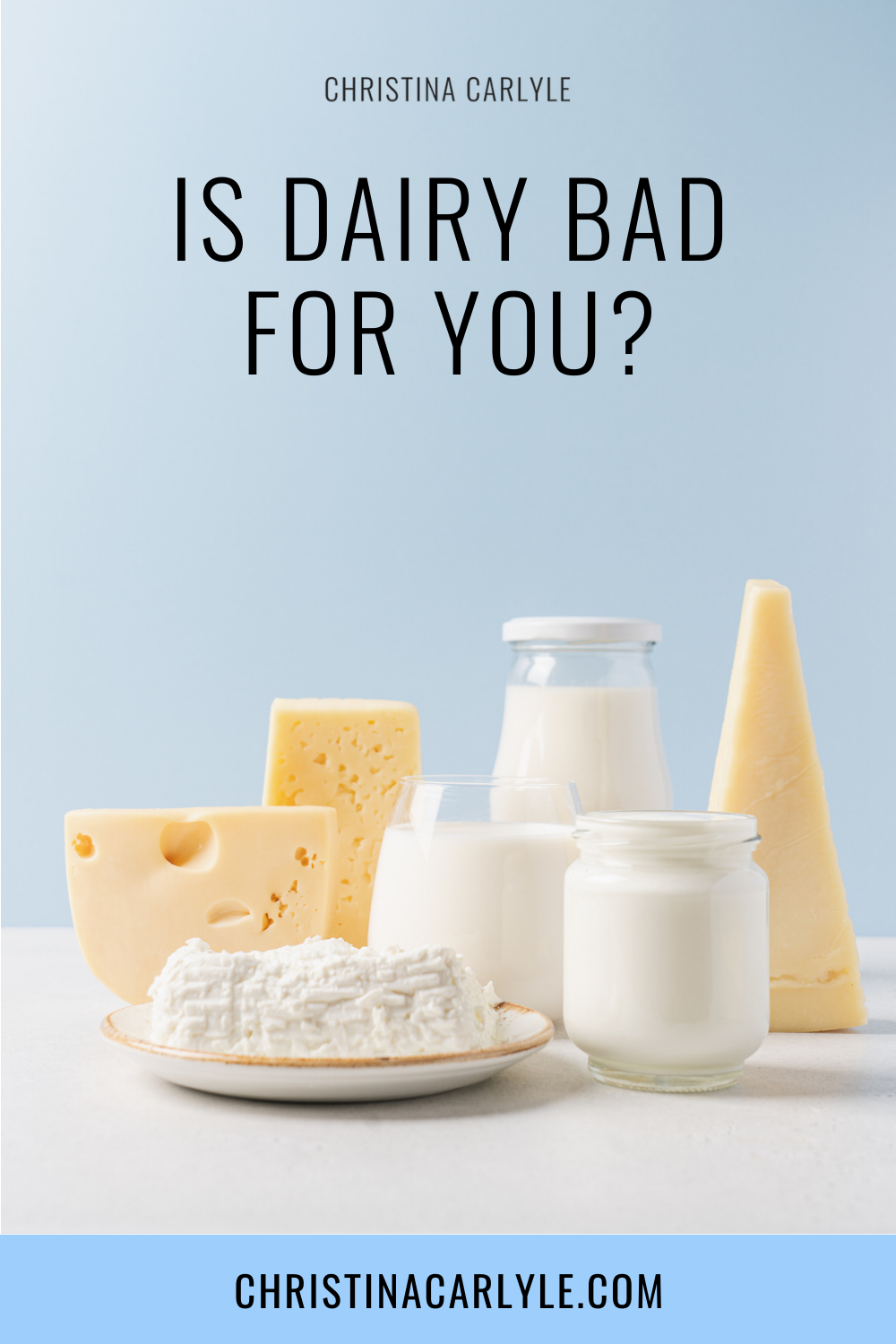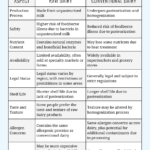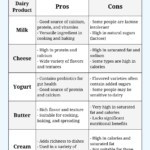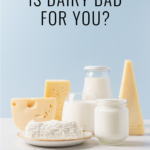Last Updated on April 18, 2024
Dairy is a hot topic in the health and wellness space, with everyone wondering is dairy bad for you? Is dairy ok to eat? This trend and line of questioning is driven by a lot of misconceptions about dairy and can be quite confusing.
It’s even more confusing because when it comes to dairy there are a LOT of pros and cons to consider.
That’s why I’m addressing everything you need to know about dairy to see if it’s truly good for you, or not.
Long story short, not all dairy is created equally – and neither are people. Your ability to tolerate dairy or have a bad/good reaction to the different types will ultimately be unique to you.
I’m going to provide insider insight and things to consider so you can determine if dairy is bad for you or if it’s safe to indulge without any adverse affects.
I’ll be covering:
- The different types of dairy and the benefits and possible issues each type can cause
- Conventional Dairy Vs. Raw
- How Dairy can be Addictive
- How Dairy affects Hormones and
- If Dairy is inflammatory
By the time you’re done reading you’ll know if dairy is bad for you or if you should keep it in your diet. Let’s dig in!
Different Types of Dairy, Benefits & Possible Issues
Dairy refers to products derived from the milk of mammals, most commonly cows, but also goats, sheep, and buffalo. Camel milk is also a thing… albeit rare it is available in some markets.
Here’s a list of the most common dairy products along with their pros (benefits) and cons (possible adverse reactions) that could make the ‘bad’ for you (or not):
Milk:
- Pros: Excellent source of calcium, protein, and other essential nutrients like vitamin D and potassium. Supports bone health, muscle growth, and overall nutrition.
- Cons: Some people may be lactose intolerant, experiencing digestive discomfort such as bloating, gas, or diarrhea after consuming milk. Additionally, milk allergies are relatively common, causing allergic reactions ranging from mild to severe.
Cheese:
- Pros: Rich in calcium and protein, cheese adds flavor and texture to many dishes. It also provides essential nutrients like vitamin B12 and phosphorus.
- Cons: High in saturated fat and calories, which can contribute to weight gain and increased risk of heart disease if consumed excessively. Like milk, cheese can cause digestive issues in lactose intolerant individuals. Cheese also tends to be more habit forming (and addictive) compared to other sources of dairy.
Yogurt:
- Pros: Contains probiotics, beneficial bacteria that support gut health and digestion. High in protein, calcium, and vitamins like B12 and riboflavin.
- Cons: Some flavored yogurts can be high in added sugars, which may negate some of the health benefits. Like other dairy products, yogurt can cause digestive discomfort for those with lactose intolerance.
Butter:
- Pros: Provides flavor and richness to foods. Contains fat-soluble vitamins like A, E, and K.
- Cons: High in saturated fat and cholesterol, which can contribute to heart disease and other health issues when consumed in excess. Not suitable for individuals with dairy allergies.
Ice Cream:
- Pros: A delicious treat enjoyed by many, providing calcium and some essential nutrients depending on the ingredients.
- Cons: Often high in added sugars and saturated fats, leading to weight gain and increased risk of chronic diseases like diabetes and heart disease. Not suitable for lactose intolerant individuals or those with dairy allergies.
Cream:
- Pros: Adds richness and flavor to dishes and beverages. Contains some vitamins and minerals.
- Cons: High in calories and saturated fat, which can contribute to weight gain and heart disease risk. Not suitable for those with dairy allergies or lactose intolerance.
Conventional Vs. Raw Dairy
The next thing to consider if that would make dairy bad or not is how it’s processed… and by this I mean is it pasteurized or not? Again, each type of processing has it’s unique place, benefits, and risk factors.
Conventional Dairy:
- Production Process: Conventional dairy products undergo pasteurization and homogenization during processing. Pasteurization involves heating the milk to a high temperature to kill harmful bacteria, while homogenization breaks down fat molecules to prevent cream separation.
- Safety: Pasteurization significantly reduces the risk of foodborne illnesses by killing pathogens like E. coli, Salmonella, and Listeria that may be present in raw milk. From there the milk is sold or used to make other dairy products like cheese or butter.
- Availability: Conventional dairy products are widely available in supermarkets and grocery stores.
- Regulation: Conventional dairy production is subject to strict regulations and quality control standards to ensure safety and consistency.
Raw Dairy:
- Production Process: Raw dairy products are made from unpasteurized milk that has not undergone heat treatment to kill bacteria. This means the milk retains its natural enzymes and beneficial bacteria.
- Nutrient Content: Some proponents of raw dairy claim that it contains higher levels of beneficial nutrients, probiotics, and enzymes compared to pasteurized dairy. However, scientific evidence supporting these claims is limited and controversial.
- Safety Concerns: Raw dairy poses a higher risk of foodborne illness due to the potential presence of harmful bacteria like E. coli, Salmonella, Campylobacter, and parasites. Consuming raw dairy products carries a risk of infections, particularly for vulnerable populations such as young children, pregnant women, the elderly, and individuals with weakened immune systems.
- Legality: The sale of raw dairy products is restricted or prohibited in many countries due to safety concerns. In places where it is legal, raw dairy products are often labeled with warnings about the potential health risks associated with consumption.
I personally wouldn’t recommend raw dairy because it’s very hard to find and could potentially be harmful.
Potential for Addiction
Another thing to consider when asking if dairy bad for you is that dairy, regardless of the type (cheese, yogurt, milk, etc.) is that it has the potential to be addictive. Dairy products contain several components that may contribute to addictive-like behaviors in some individuals. Here are a few reasons how dairy can be addictive:
- Casein and Whey Proteins: Dairy products are rich in proteins, particularly casein and whey. Casein, in particular, breaks down in the body to produce casomorphins, which are peptides with opioid-like properties. These compounds can interact with opioid receptors in the brain, potentially leading to feelings of pleasure and reward, similar to the effects of opioids.
- Lactose: Lactose is the primary carbohydrate found in dairy products. When consumed, lactose stimulates the release of dopamine in the brain’s reward center. Dopamine is a neurotransmitter associated with pleasure and reinforcement, and its release can contribute to feelings of satisfaction and pleasure, which may reinforce the desire to consume it.
- Fat Content: Dairy products often contain varying amounts of fat, which can contribute to their palatability. Fat is a dense source of energy, and foods high in fat can trigger the release of dopamine and other neurotransmitters associated with reward and pleasure. This can lead to a desire to consume more (and more), particularly those options that are high in fat.
If you’re the type of person that eats an entire bag of shredded cheese, rips through a bottle or two of creamer or milk a week, or constantly craves dairy these are all signs of addiction. In this case, dairy isn’t good for you because you’re having adverse reactions to it. The more you have an adverse reaction to something the more you’ll crave it. The only treatment plan for addiction is abstinence.
Is Dairy Bad for Hormones?
Another reason why dairy could potentially be considered ‘bad’ is because it has the potential to imbalance hormones. Dairy products can affect hormone levels, primarily due to the presence of naturally occurring hormones and other bioactive compounds.
- Insulin-like Growth Factor 1 (IGF-1): Dairy products, particularly cow’s milk, contain insulin-like growth factor 1 (IGF-1), which is naturally present in the milk of lactating animals. IGF-1 is a hormone that plays a role in promoting growth and development. When consumed, IGF-1 can be absorbed into the bloodstream and may influence hormone levels in the body. Some research suggests that elevated levels of IGF-1 may be associated with increased risk of certain health conditions, including cancer.
- Sex Hormones: Dairy products can also contain small amounts of sex hormones, such as estrogen and progesterone. These hormones are naturally present in the milk of lactating animals and may influence hormone levels in individuals who consume dairy products. While the levels of sex hormones in dairy are generally low compared to endogenous hormone levels in humans, some researchers have raised concerns about potential health effects, particularly in vulnerable populations such as children and adolescents.
- Growth Hormones and Antibiotics: In some dairy farming practices, growth hormones and antibiotics may be administered to dairy cows to promote growth and prevent infections. Residues of these substances can be present in dairy products and may potentially affect hormone levels in consumers. However, regulatory agencies such as the FDA and USDA have established safety standards and monitoring programs to ensure that dairy products meet safety requirements and do not pose significant health risks.
It’s important to note that the impact of consumption on hormone levels can vary depending on factors such as individual metabolism, overall diet, and the specific type of dairy product consumed.
Is Dairy Inflammatory?
A lot of people think dairy is bad because it causes inflammation. But, that isn’t necessarily true. Dairy, by nature isn’t inflammatory. The relationship between dairy and inflammation is complex and can vary depending on factors like type (of dairy), personal genetics, overall diet, and specific health conditions.
Here’s a general overview of how dairy could be inflammatory:
- Pro-inflammatory Potential: Some components of dairy, such as certain proteins (like casein) and saturated fats, have been suggested to have pro-inflammatory effects in the body. These components may contribute to inflammation in individuals who are sensitive or intolerant. But again, by nature it’s not inflammatory as-is. It can be if you have an inflammatory reaction to it. Keep reading…
- Lactose Intolerance: Lactose intolerance, a common condition where individuals have difficulty digesting lactose (the sugar found in milk), can lead to gastrointestinal symptoms such as bloating, gas, and diarrhea. These symptoms can sometimes be associated with inflammation in the digestive tract.
- Allergies: Dairy allergies, although less common than lactose intolerance, can also cause inflammation in susceptible individuals. Allergic reactions to dairy proteins (such as casein or whey) can range from mild (skin rashes, hives) to severe (anaphylaxis), triggering an inflammatory response in the body.
- Individual Variation: It’s important to recognize that not everyone experiences inflammation in response to consumption. Some individuals may tolerate it well and derive important nutrients without experiencing adverse effects.
- Potential Benefits: On the other hand, dairy products are also rich in essential nutrients such as calcium, vitamin D, and protein, which are important for bone health, muscle function, and overall nutrition. In some cases, the anti-inflammatory effects of certain components, such as bioactive peptides found in fermented dairy products like yogurt, may outweigh any potential pro-inflammatory effects.
- Overall Dietary Pattern: The impact of consumption on inflammation may also depend on one’s overall dietary pattern. For example, if dairy is consumed as part of a balanced diet rich in fruits, vegetables, whole grains, and healthy fats, its potential inflammatory effects may be mitigated.
Who Should Avoid Dairy?
In my practice, if I’m working with someone one on one and they present with any of the following issues I have them cut out dairy from their diet completely until the root cause is resolved.
- Gut Health or Gastrointestinal Issues – including any gut health issues or GI symptoms like bloating, gas, irregularity, pain. etc. this is especially true if you have gut health issues and weight gain.
- Parasites or Pathogens – including candida, mold, parasites, etc. See if you have symptoms of Parasites.
- Inflammation – if any inflammation is present or if symptoms of inflammation like headaches, joint pain, depression, etc. are present. Especially if you have symptoms of Intestinal Inflammation.
- Allergies – including food sensitivities or allergenic reactions.
- Skin issues – including acne, eczema, psoriasis, rashes, etc.
- Sinus issue – including post nasal drip, congestion, or reoccurring sinus or ear infections.
- Certain Metabolic Types – certain metabolic types aren’t able to metabolize and digest. When you eat for your unique metabolic type and needs it become significantly easier to lose weight and be healthy.
Milk Alternatives
If you have the risk factors mentioned above or feel like you have adverse reactions to dairy you can always use plant based milks and dairy alternatives like nut milk. You can make your own nut milk or buy it at the store. I always recommend carrageenan-free milk. Califia is my favorite and the brand I recommend most.
When determining if dairy is bad for you – or not – you need to consider all of these things.
I hope this helped clear up any confusion you may have about dairy. My best advice is to eat for your metabolic type. Different types are able to metabolize and digest different types of dairy better than others. When you consume the right foods for your type it’s a lot easier to avoid adverse health issues, get fit, and feel fantastic.
Your Coach & Biggest Cheerleader,
![]()

